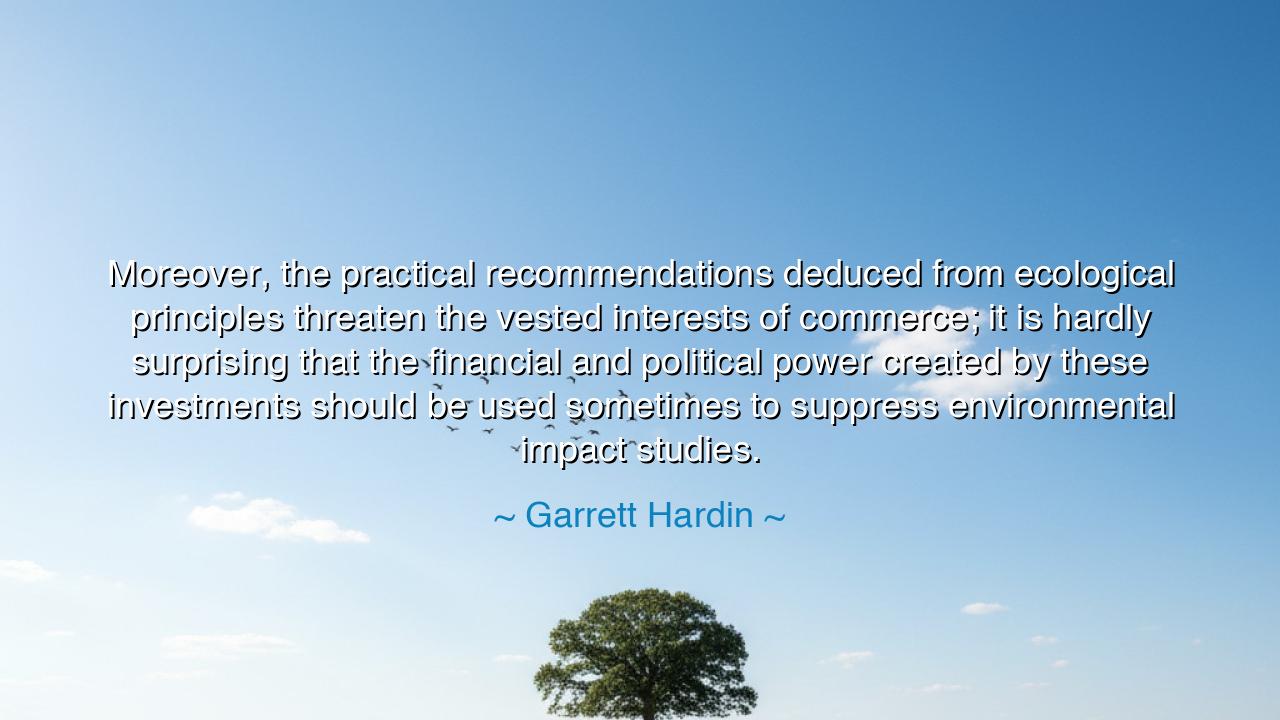
Moreover, the practical recommendations deduced from ecological
Moreover, the practical recommendations deduced from ecological principles threaten the vested interests of commerce; it is hardly surprising that the financial and political power created by these investments should be used sometimes to suppress environmental impact studies.






Hear the sobering words of Garrett Hardin, who spoke with the gravity of one who saw beyond the illusions of prosperity: “Moreover, the practical recommendations deduced from ecological principles threaten the vested interests of commerce; it is hardly surprising that the financial and political power created by these investments should be used sometimes to suppress environmental impact studies.” In this statement, Hardin tears away the veil that often hides the conflict between wisdom and wealth, between the principles of ecology and the ambitions of commerce. For he reminds us that truth, when it challenges profit, is often silenced.
At the heart of his words lies the eternal struggle: nature’s balance against human greed. Ecological principles teach us that the earth has limits, that resources must be harvested with care, and that the web of life cannot endure endless plunder. Yet such truths, if followed, would require restraint—less cutting of forests, less burning of coal, less fishing of seas. And restraint strikes at the heart of commerce, which grows fat upon expansion, consumption, and unending growth. Thus, those who hold wealth and power often resist, using their influence not to protect the earth, but to protect their profits.
History gives us many mirrors of this truth. Recall the fate of Rachel Carson, whose book Silent Spring exposed the dangers of pesticides to birds, water, and people. The industries threatened by her revelations unleashed their wealth to discredit her, to bury her warnings, to suppress the very environmental impact studies that might have proven her right. Yet her courage prevailed, and her voice ignited a movement that changed the course of environmental history. Hardin’s words echo her struggle: truth, when it threatens wealth, will always face opposition.
The ancients, too, knew this conflict well. The prophets of Israel spoke against kings who exploited the land and oppressed the poor, warning that greed would bring ruin to the nation. In Greece, philosophers like Plato taught that rulers must care not only for wealth but for the harmony of the polis and the earth. Yet again and again, wealth bought silence, and truth-tellers were cast aside. Hardin’s wisdom is not new—it is the ancient cry of conscience, repeated in modern terms, reminding us that power defends itself, even against reason.
The phrase “suppress environmental impact studies” should strike like thunder in our ears. For what is suppressed is not merely paper and ink, but the future itself. When studies are silenced, rivers die in secret, forests fall without record, air darkens without witness. To suppress knowledge is to turn one’s face from truth, to choose short-term profit over long-term survival. It is to bind the hands of those who would defend creation, leaving the earth voiceless against its destroyers.
The lesson is clear: those who care for the earth must be vigilant. Do not assume that truth will always be welcomed. Power resists change, and wealth fears restraint. But silence in the face of suppression is betrayal—betrayal of the land, the water, the air, and the generations yet unborn. Like Carson, like Hardin, we must be willing to speak, to study, to reveal, even when opposed by mighty powers. For though commerce may suppress a study for a season, the truth of the earth will always rise again.
Practical action lies before us. Support those who pursue honest science, free from the chains of moneyed interest. Demand transparency from leaders and corporations alike. Question not only what is sold to you, but what is hidden from you. And in your own life, live in harmony with ecological principles, showing by example that prosperity need not mean destruction.
Thus, Hardin’s words endure as both warning and call: that whenever ecological wisdom threatens the throne of wealth, there will be resistance. But resistance must not deter us. For the earth is our inheritance, fragile and precious, and if we do not defend it against greed, there will be nothing left to defend at all. Let every generation remember: the silence of suppressed studies is the silence of a dying world, and only courage can break it.






AAdministratorAdministrator
Welcome, honored guests. Please leave a comment, we will respond soon